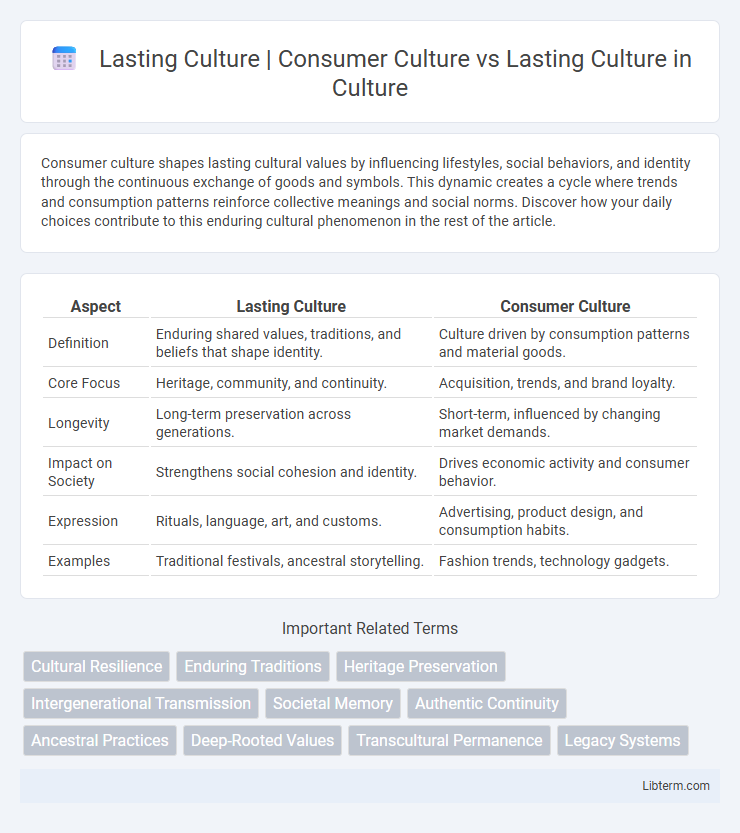Consumer culture shapes lasting cultural values by influencing lifestyles, social behaviors, and identity through the continuous exchange of goods and symbols. This dynamic creates a cycle where trends and consumption patterns reinforce collective meanings and social norms. Discover how your daily choices contribute to this enduring cultural phenomenon in the rest of the article.
Table of Comparison
| Aspect | Lasting Culture | Consumer Culture |
|---|---|---|
| Definition | Enduring shared values, traditions, and beliefs that shape identity. | Culture driven by consumption patterns and material goods. |
| Core Focus | Heritage, community, and continuity. | Acquisition, trends, and brand loyalty. |
| Longevity | Long-term preservation across generations. | Short-term, influenced by changing market demands. |
| Impact on Society | Strengthens social cohesion and identity. | Drives economic activity and consumer behavior. |
| Expression | Rituals, language, art, and customs. | Advertising, product design, and consumption habits. |
| Examples | Traditional festivals, ancestral storytelling. | Fashion trends, technology gadgets. |
Understanding Lasting Culture
Lasting Culture encompasses enduring values, traditions, and practices that shape consumer behavior beyond fleeting trends. Unlike Consumer Culture, which emphasizes immediate gratification and constantly changing preferences, Lasting Culture builds long-term brand loyalty through meaningful connections and consistent identity. Understanding Lasting Culture involves recognizing deep-rooted societal influences and emotional engagement that sustain brands over time.
Defining Consumer Culture
Consumer culture is defined by the continuous acquisition and consumption of goods and services driven by the desire for status, identity, and social belonging. It prioritizes material wealth, brand loyalty, and trends, often fostering disposable mindsets and short-term gratification. This contrasts with lasting culture, which values sustainability, heritage, and enduring traditions over transient consumerism.
Key Differences Between Lasting and Consumer Culture
Lasting Culture emphasizes enduring values, traditions, and deep-rooted social norms passed down through generations, promoting sustainability and community cohesion. Consumer Culture centers on materialism, constant consumption, and short-term gratification driven by market trends and advertising. The key differences lie in Lasting Culture's focus on timeless significance and preservation versus Consumer Culture's emphasis on instant appeal and disposable goods.
Origins and Evolution of Lasting Culture
Lasting Culture originates from deep-rooted traditions and values passed through generations, emphasizing sustainability and timeless practices that shape consumer behavior over time. Unlike Consumer Culture, which prioritizes immediate satisfaction and mass consumption driven by trends, Lasting Culture evolves through the conscious preservation of heritage and mindful usage of resources. This evolution fosters communities that value long-term impact, cultural identity, and ecological balance in their consumption habits.
The Rise of Consumer Culture in Modern Society
The rise of consumer culture in modern society emphasizes instant gratification, material acquisition, and trend-driven consumption patterns that dominate daily life. Lasting culture, by contrast, values enduring traditions, deep-rooted customs, and sustainable practices that promote long-term societal well-being. Shifts towards consumerism reflect broader economic growth, digital innovation, and marketing influences shaping contemporary values and lifestyles.
Values and Beliefs: Lasting vs Consumer Culture
Lasting culture emphasizes core values and beliefs centered on sustainability, community, and long-term well-being, promoting meaningful traditions and ethical practices. Consumer culture prioritizes immediate gratification, material wealth, and constant consumption, often leading to short-lived trends and disposable lifestyles. The contrast highlights lasting culture's focus on enduring principles versus consumer culture's emphasis on transient desires and economic growth.
Cultural Sustainability: What Endures Over Time?
Lasting culture emphasizes cultural sustainability by preserving traditions, values, and practices that endure over time, unlike consumer culture which prioritizes transient trends and material consumption. This sustainable approach fosters deep-rooted identity and social cohesion while resisting the constant cycle of disposability characteristic of consumerism. Cultural sustainability ensures heritage and collective memory persist across generations, promoting resilience and meaningful continuity in evolving societies.
The Impact of Consumerism on Traditional Values
Consumer culture drives rapid consumption and frequent product replacement, often eroding traditional values rooted in durability and heritage. Lasting culture emphasizes sustainability, quality, and the preservation of cultural identity across generations. The tension between consumerism and lasting culture highlights the need for mindful consumption that respects historical significance and environmental impact.
Building and Preserving a Lasting Culture
Building and preserving a lasting culture requires intentional strategies that embed core values into everyday practices and organizational systems. Consumer culture often prioritizes short-term trends and rapid consumption, while lasting culture emphasizes sustainability, deep-rooted identity, and long-term commitment. Fostering transparent communication, employee engagement, and consistent leadership behaviors helps maintain a resilient culture that adapts yet endures over time.
Choosing Between Consumer Trends and Lasting Legacy
Choosing between consumer culture and lasting culture involves prioritizing sustainable values over fleeting trends. Consumer culture emphasizes short-term gratification and rapid consumption, often driven by marketing and seasonal fads, while lasting culture cultivates enduring customs, heritage, and meaningful societal impact. Focusing on lasting legacy fosters deeper brand loyalty, cultural significance, and long-term value beyond immediate market fluctuations.
Lasting Culture | Consumer Culture Infographic

 libterm.com
libterm.com